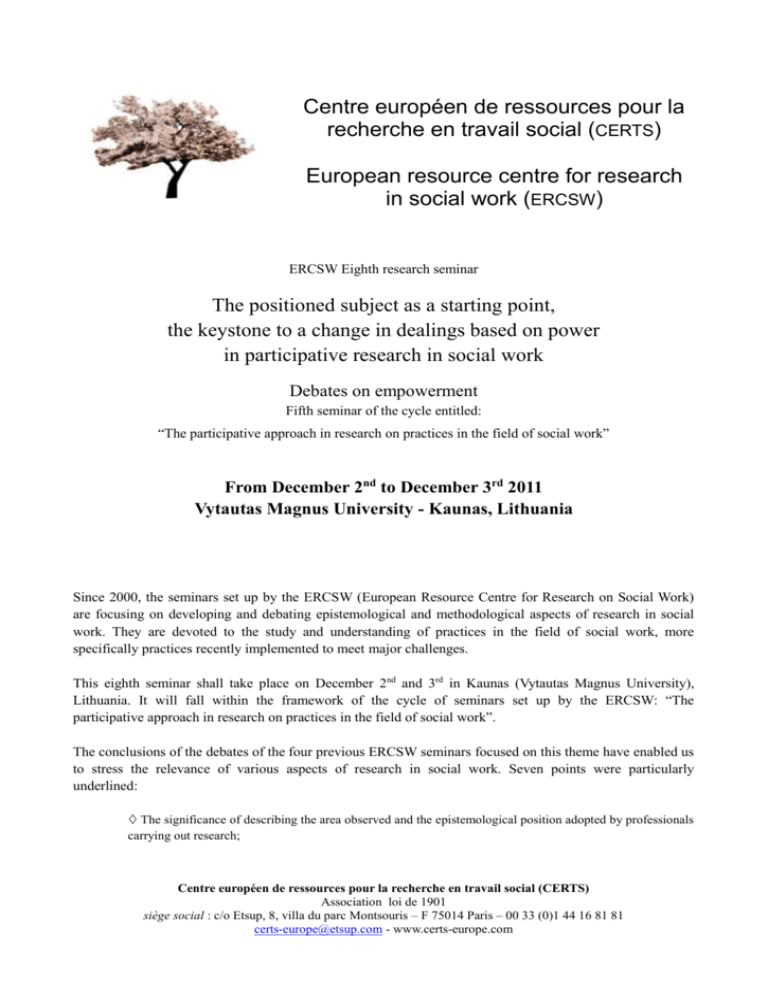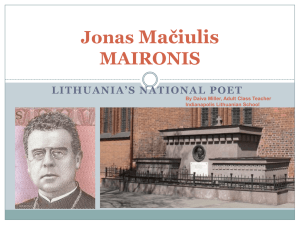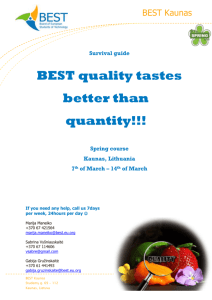ERCSW Eighth research seminar The positioned subject as a
advertisement

Centre européen de ressources pour la recherche en travail social (CERTS) European resource centre for research in social work (ERCSW) ERCSW Eighth research seminar The positioned subject as a starting point, the keystone to a change in dealings based on power in participative research in social work Debates on empowerment Fifth seminar of the cycle entitled: “The participative approach in research on practices in the field of social work” From December 2nd to December 3rd 2011 Vytautas Magnus University - Kaunas, Lithuania Since 2000, the seminars set up by the ERCSW (European Resource Centre for Research on Social Work) are focusing on developing and debating epistemological and methodological aspects of research in social work. They are devoted to the study and understanding of practices in the field of social work, more specifically practices recently implemented to meet major challenges. This eighth seminar shall take place on December 2nd and 3rd in Kaunas (Vytautas Magnus University), Lithuania. It will fall within the framework of the cycle of seminars set up by the ERCSW: “The participative approach in research on practices in the field of social work”. The conclusions of the debates of the four previous ERCSW seminars focused on this theme have enabled us to stress the relevance of various aspects of research in social work. Seven points were particularly underlined: The significance of describing the area observed and the epistemological position adopted by professionals carrying out research; Centre européen de ressources pour la recherche en travail social (CERTS) Association loi de 1901 siège social : c/o Etsup, 8, villa du parc Montsouris – F 75014 Paris – 00 33 (0)1 44 16 81 81 certs-europe@etsup.com - www.certs-europe.com The relevance of a cross-disciplinary approach and of knowledge transfers, as opposed to the inadequacies of simple inter- and multidisciplinary approaches; The need to put together knowledge shared by researchers and professionals as well; The place of the participative approach and joint practices in research on practices and the kind of knowledge produced in social work; The significant role of discourse in participative research, in which involvement is understood as a creation of a common space shared by professionals and researchers alike; The sort of person the “third party/mediator” is, no longer understood as a person or an object playing the part of a mediator in certain situations, thus enabling to solve conflicts inherent to duality, but rather as conveying meaning for the related persons; The intermediate or interstitial epistemological posture situated between the strained poles represented by theory and practice, and its significance in the making up of research on practices in the field of social work. During the seminar in Kaunas we shall resume the debates, focusing more specifically on the issue of power in the participative approach in research in social work. Our starting point shall be what happens to the different persons in their everyday life and particularly how they consider their situation. Starting from the positioned subject presupposes that the researcher adopts an epistemological posture which will serve as a guideline for designing the research process. Besides, one may agree that the purpose of social work is to emancipate persons, and empowerment seems to bring about such an emancipation. During this seminar, we would like to explore three avenues of research: 1) The first one deals with the form(s) of social change when the chosen research processes and purposes prompt an evolution in social practices. Two types of questions could be examined: The ambiguity of participative research when it comes to its unthought-of aspects with on one hand a reasoning based on dialogue, reflexivity and evolution, and on the other hand asymmetrical relations inducing connections based on power, often unheeded, but giving way to clashes. The analysis of the meaning and significance of the essentials of a process in participative research concerning on one hand a subject in a specific situation, and on the other hand the evolutions in the social context, social services, political speeches and State policies. 2) The second one deals with the research reasoning, starting from the point of view of persons, which reveals their vulnerability and private lives, and thus shall be supported by subjective experience, understood as an area to create knowledge. Two types of questions could then be suggested: What is the part played by the researcher in this structure created by dealings between subjects and its methodological inferences? How do we identify, for each person participating in the research, the dilemmas within the processes of knowledge emergence and self transformation? 2 3) The third avenue which has been our guideline since these seminars began, deals with the theories and methodologies called up by the researchers concerning empowerment and the implied epistemological postures. This call is aimed at: Researchers in the field of social work and Ph.D. students interested in the problematic of this seminar, Professionals from the field of social work, interested and involved in participative research on social work practice, All members of the ERCSW association and all those who took part in previous seminars. Languages used at the seminar: French, English. Abstracts are expected on October 20th 2011 at the latest. Papers must be handed in electronic form, in the language used to read it, as well as the five key-words in French and English to the following address: certs.secretariat@etsup.com A publication in the Lithuanian review “SOCIAL WORK. METHODS & EXPERIENCES” will put together a selection of papers. These texts shall be handed during the seminar or within 30 days afterwards. Committees Scientific committee: Jonas RUSKUS (Chairman), Rasa NAUJANIENE, Natalija MAZEIKIENE (Vytautas Magnus University, Kaunas, Lithuania), Ewa MARYNOWICZ-HETKA (University of Lodz, Poland), Dominique PATUREL (INRA, UMR 951, Innovation, France), Jean FOUCARD (Haute Ecole of Louvain-en-Hainaut, Charleroi, Belgium), Elisabeth CALLU (PREFAS GRIF, France), Chantal GOYAU (Ecole Supérieure de Travail Social, ETSUP, France), Mariusz GRANOSIK (University of Lodz, Poland), Anita GULCZYNSKA (University of Lodz, Poland), Marcel JAEGER (CNAM, Paris, France), Katherine TYSON McCREA (Loyola University, Chicago School of Social Work, USA). Steering committee: Jonas RUSKUS, Violeta INVANAUSKIENE, Zivile LUKOSIENE (Vytautas Magnus University, Kaunas, Lithuania). Location and program of the seminar The seminar will take place in Kaunas: Daukanto g. 28 Mazoji sale, Kaunas LT – 44246 LITHUANIA Web site: www.sgi.vdu.lt For any piece of information, please apply to: Jonas RUSKUS 3 Phone number: +37062014036 e-mail: j.ruskus@smf.vdu.lt ERCSW: Chantal GOYAU e-mail: chantal.goyau@etsup.com The program will be built from the communications and will get organized in panels, workshops and conferences. The seminar will take place from: Friday, December 2nd 2011 at 9:30 a.m. To Saturday, December 3rd 2011 at 13:00 a.m. The ERCSW association will hold its annual general meeting during the seminar. Registration fees Registration fees are €50 (fifty) per person (coffees, lunch and dinner on Friday included). Transport and accommodation as well as lunch on Saturday are at the charge of the participants. Banking coordinates for payment: Name of establishment: Vytautas Magnus University Name of the bank: SEB Bank SWIFT or BIC: CBVILT2X IBAN or account number: LT 047044060002848625 Account holder’s name: CERTS Address of account holder: Gedimino Ave. 12, LT-01103 VILNIUS Please indicate the name of the participant on the document. Accommodation The seminar will take place in the centre of Kaunas. Hereunder, a list of hotels located in the centre of town : Kaunas Hotel, http://www.kaunashotel.lt/en (from €70 a night) Park Inn Hotel, http://www.parkinn.com/hotel-kaunas (from €60 a night) Best Western Santaka, http://www.santakahotel.en/EN/Kaunas (from €45 a night) Amberton Cozy, http://www.ambertonhotels.com/Kaunas (from €45 a night). WELCOME TO KAUNAS! 4







